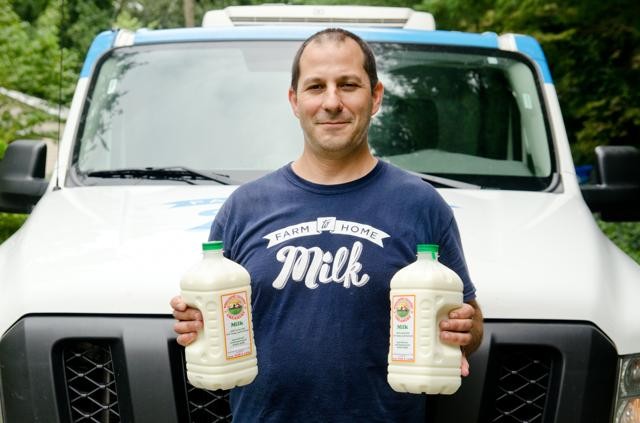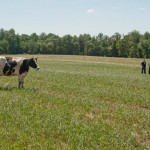- “There’s a clientele in Asheville that’s super-knowledgeable about milk and really wants that purity, the 100 percent grassfed and the cream-line milk, the unhomogenized.” — Jonathon Flaum photos by Max Cooper
- Straight from the cow: When the cow takes in more vitamins, enzymes and other nutrients from the grass, the person who drinks the milk gets more nutrients too, says longtime dairy farmer John Hostetler of Wholesome Country Creamery.
- Milk to go: West Asheville-based MilkCo packages 1 million gallons of milk every week, distributing it to Ingles Markets (which owns the company), US Foods, Earthfare and other outlets.
By 9 a.m. on Monday mornings, Jonathon Flaum is already more than 100 miles from home. He’s a milkman on a mission, and in his massive, refrigerated van, he’s navigated down from the mountains and through the flatlands beyond. He’s headed to Wholesome Country Creamery, a Hamptonville, N.C., dairy just west of Winston-Salem.
The drive takes Flaum a couple of hours and as many cups of coffee, but the product he’s after is worth it, he says. Wholesome Country Creamery is Asheville’s closest source for grassfed, minimally processed milk.
Flaum launched his delivery business, Farm to Home Milk, in January with milk from Maple View Farm in Hillsborough, N.C. The dairy pasteurizes and homogenizes milk on-site, and packages it in glass bottles. The specialty product drew an immediate following, Flaum says, but some customers wanted milk with even less processing (see “A Guide to Processing Milk”).
“There’s a clientele in Asheville that’s super-knowledgeable about milk and really wants that purity, the 100 percent grassfed and the cream-line milk, the unhomogenized,” he says. “They talk about the health [benefits] of grassfed and, also, the old-time feeling of having cream on top.”
In February, Flaum partnered with John Hostetler, who runs Wholesome Country Creamery with his family. Hostetler has been raising dairy cows since 1979, but until this year, he’s always sold his milk to a larger operation that picked it up in a tanker truck and mixed it with milk from other farms.
The Wholesome Country Creamery brand is Hostetler’s first shot at independence. It’s a line of minimally processed dairy products that haven’t been homogenized. And it comes from cows raised mostly — or in some cases, exclusively — on grass.
As Flaum puts it, there are more ways to milk a cow than consumers might realize. “The perception is that there are two choices with milk: raw or highly processed industrial milk,” he says.
But North Carolina is one of 17 states where it’s illegal to sell raw milk for human consumption.
“It’s hard to tell people there is this other product out there in the middle, meeting the demands of your high standard of nutrition that is out of the industrial complex. It’s gotten hard for people to believe that that exists.”
The middle way
Flaum and Hostetler are an unlikely pair. Flaum has been a milkman for less than a year. He started Farm to Home Milk after stints as a corporate consultant, Zen monk and playwright.
Hostetler, on the other hand, has childhood memories of playing in the dairy barn on his dad’s farm. He grew up in an Amish community in central Pennsylvania, where he later started a dairy farm of his own. He relocated to the small New Order Amish community in Hamptonville in 2005.
As a young farmer, Hostetler looked out for his cows, feeding some of them a 70 percent grass diet and others a 100 percent grass diet, depending on how he markets their milk. “When I started, my focus was getting the highest production, but I soon found out that there’s other things you need to focus on to stay in business,” he says. “Now I focus on herd health and bottom line. If we don’t have herd health, our cost goes up.”
Plus, Hostetler is fascinated by the science of nutrition. “When I start talking about nutrition, my wife says I don’t stop,” he says.
By his explanation, milk comes from the soil. Minerals from the ground appear in the grass, corn and soybeans he grows for feed (all of his crops are non-GMO, he adds). Those same nutrients contribute to the health of the cow, the look and taste of the milk and, finally, the nourishment of the consumer. When the cow takes in more vitamins and enzymes from the grass, the person who drinks the milk gets more nutrients too, Hostetler says.
In February, Flaum convinced the dairy farmer that there’s a strong market for 100 percent grassfed, minimally processed milk, although Hostetler still questions whether consumers will pay more when they can have a 70 percent grassfed product with only a slight difference in taste. (Wholesome Country Creamery’s 100 percent grassfed milk costs $1 more per half-gallon than its 70 percent product.)
“Can the consumer afford [100 percent] grassfed?” he says. “I have done the blind test on the grassfed and on our conventional product that we produce here. I have yet to really pick [a difference] up.”
However, the color difference between the two milks is obvious. The grassfed milk looks more yellow — or green; Hostetler attributes the color difference to chlorophyl and amino acids. The orange-yellow hue, in particular, comes from carotenes (a precursor to vitamin A), according to Harold McGee, author of On Food and Cooking.
Whether consumers prefer milk from 70 or 100 percent grassfed cows, all Wholesome Country products are minimally processed, which is one of the biggest draws of the brand, says Flaum. “I think what folks in Asheville are liking about the low-temp pasteurization and the non-homogenized is that it’s as close to raw as they can get,” he says.
Hostetler’s milk goes through a process called vat pasteurization: The milk is heated to 145 degrees for 30 minutes. That’s significantly cooler than the ultra-pasteurized process, which gives milk a longer shelf life but, some say, a more cooked flavor.
High temperatures kill bacteria in milk. The whole point of pasteurization — introduced in the 19th century and widely used for milk processing by the 1960s — is that it eradicates dangerous bacteria and increases shelf life.
But opponents of pasteurization say some bacteria in milk, such as Lactobacilli, has digestive benefits that should be preserved. And according to the “Real Milk” campaign run by the Weston A. Price Foundation, “Pasteurization destroys enzymes, diminishes vitamin content, denatures fragile milk proteins, destroys vitamins C, B12 and B2 … and is associated with allergies” and other illnesses.
The U.S. Food and Drug Administration and the North Carolina Division of Public Health counter that pasteurization is needed to kill salmonella, E. coli and other bacteria that can be deadly.
Nonetheless, Hostetler’s household of eight drinks only raw milk — about 3 gallons a day, he says. “I prefer raw milk,” says Hostetler, adding that low-temperature, long-time pasteurized milk is “much better” than ultra-pasteurized.
In Asheville, consumers seem receptive to low-temp milk as an alternative to raw or ultra-pasteurized: Flaum sells about 50 gallons of Wholesome Country Creamery milk each week, and that volume is growing.
He recently began stocking the dairy’s milk, butter and goat milk at French Broad Food Co-op.
Straight from the cow
While Flaum drives long distances for a product between raw and processed, some consumers already are drinking and buying raw in the Asheville area.
One farmer, who asked Xpress to keep his identity a secret, sells about 50 gallons of raw milk a week in town. Nine states around the country, including South Carolina and Pennsylvania, allow raw cow’s milk to be sold in grocery stores and other retail locations.
“The FDA’s already called me once,” he says. “He was real nice. We just had a real good conversation.”
The dairy farmer told the official that his milk was for pet food, a legal use in North Carolina.
“I said, ‘I don’t have any milk for you to inspect,’” the farmer recalls. “[The official] said, ‘Are you telling me you don’t have any milk?’”
“I said, ‘No sir, I have three refrigerators full of milk, but you don’t inspect dog food, cat food, calf milk and stuff like that. If you can find anybody that I have ever told to drink this milk, I’d appreciate it if you’d tell me where they’re at, and I’ll meet you there, and we’ll talk to them.’”
On every glass jar of milk he sells, the farmer attaches his own sticker, designating it for pet consumption only. The label isn’t FDA-approved.
Kate and Kevin Lane use a state-issued, FDA-approved label at their farm, Homemade in Marshall. They sell about 50 gallons of raw milk from 100 percent grassfed cows each week. “I did everything I needed to do to become a pet-food company,” Kate says. “In North Carolina, that’s the loophole: You can sell raw milk for pets.”
Although Kate surmises that some customers drink the milk or make yogurt from it, she says she’s not sure what happens to it after it leaves the farm. “We don’t give any advice for human use,” she says. “I know that the majority of our customers are not just buying it for their pets, but there actually are some who do significantly share it with their pets.”
Raw milk is particularly good food for chickens and puppies, she notes. One customer even uses it as fertilizer, although this practice is expensive.
In the past, the Lanes sold raw milk through cow shares, in which each customer owns stock in the cow that produces the milk. But that practice has been outlawed in North Carolina.
“It would be really nice for us to be selling a product that was approved for human consumption,” Kate says.
There’s a bill in the N.C. House of Representatives to eliminate laws that prevent cow shares and make it legal to dispense (but not sell) raw milk for human consumption. Proposed in April, House Bill 792 is undergoing committee review. No action has been taken otherwise.
On the shelf
Keith Collins, president of MilkCo in West Asheville, says he doesn’t understand why consumers go to such lengths for raw or minimally processed milk.
“We work so hard to eradicate diseases from raw milk,” he says. “I think it’s a risk and reward. Why take the risk for no reward? It’s a big risk.”
He worries that an outbreak of disease from raw milk could cast a shadow over the entire milk industry. Furthermore, milk sales in general are declining. In 2011, the USDA announced that milk sales had dropped by more than 50 percent since the early 1980s. Collins attributes the decline to the “many alternatives” customers have these days. “You’ve got almond milk. You’ve got soy milk, coconut milk,” he says.
Owned by Ingles Markets, MilkCo processes and packages about 1 million gallons of milk each week and distributes it throughout the Southeast. The company also packs milk for Earthfare, US Foods and many other brands. Its milk goes to grocery stores, summer camps, hospitals and more.
But in a weakening market, Collins knows he must diversify. MilkCo also packages 200,000 gallons a week of water, juice and other drinks. Collins is considering getting the equipment to make almond milk.
Perhaps the most surprising detail about MilkCo? Its milk isn’t ultra-pasteurized. Nor is it vat-pasteurized like the Wholesome Country Creamery brand. Rather, it undergoes HTST pasteurization, in which it’s heated to at least 161 degrees, according to FDA standards.
“Ultra-temperature can sometimes give you a cooked flavor,” Collins says. “Some people like that. Some people don’t. If you don’t have a preference, [ultra] gives you a longer shelf life.”
But HTST could actually be holding MilkCo back. Collins will have to explore ultra-pasteurization to start making nut milks. “Right now, almond milk is ultra-pasteurized because of the longer shelf life,” Collins says. “We’d have to investigate … how we want to go about doing that.”
The demand for milk alternatives is a symptom of the information age, Collins says, although he recognizes that his best option is to adapt to changes in the market. “You’ve got all kind of misconceptions about what’s good for you and what’s not good for you,” he says. “There’s so many choices. If you look in the store in the dairy case, it used to be it was all milk. Now it’s all these other alternative drinks.”
Whatever the choices, starting a milk-delivery business made sense to Flaum. He notes the simple pleasure of handling bottles of fresh cold milk and doing work that gets beyond the world of words and corporate business that he used to be part of. “The bottom line for why I wanted to do this — and do it as a family and not just as the direct connection to the farmer — I wanted that connection to something genuine and authentic.”
For more information about Farm to Home Milk, which also delivers eggs, bread, meat, poultry and other products, go to farmtohomemilk.com. For information about Homemade in Marshall, go to homemadeinmarshall.com.
Managing Editor Margaret Williams contributed to this report.







Before you comment
The comments section is here to provide a platform for civil dialogue on the issues we face together as a local community. Xpress is committed to offering this platform for all voices, but when the tone of the discussion gets nasty or strays off topic, we believe many people choose not to participate. Xpress editors are determined to moderate comments to ensure a constructive interchange is maintained. All comments judged not to be in keeping with the spirit of civil discourse will be removed and repeat violators will be banned. See here for our terms of service. Thank you for being part of this effort to promote respectful discussion.